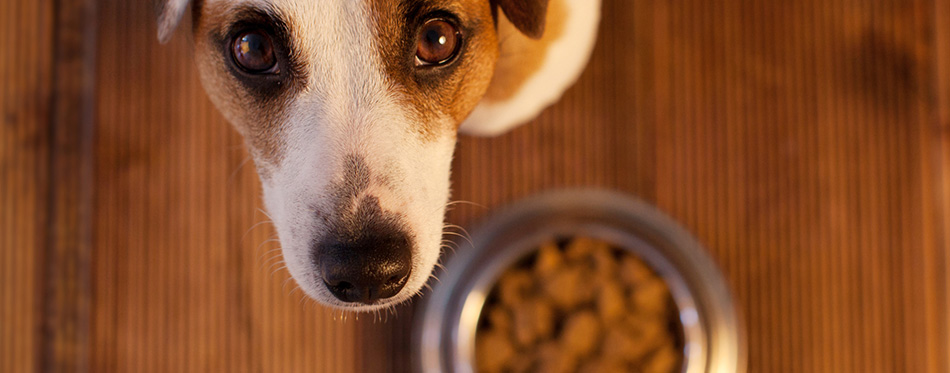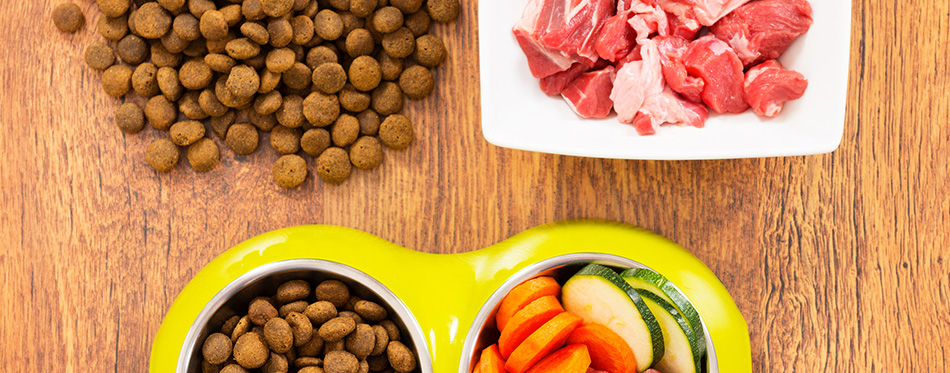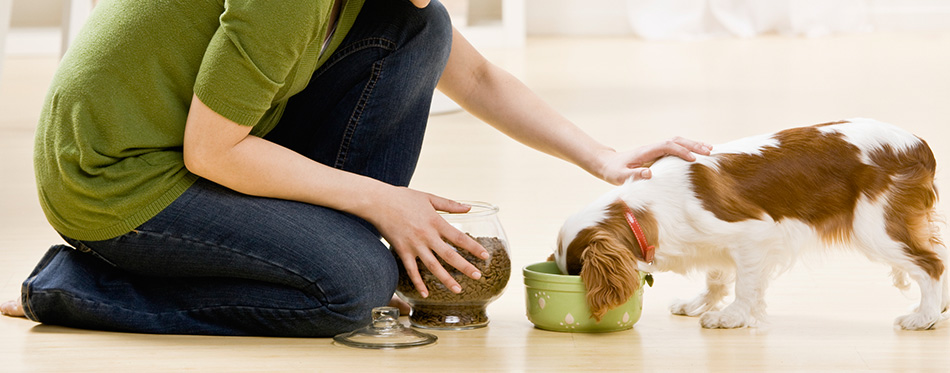In the US, one in 5 dogs is obese while about 34% are overweight. In the UK, the figures of canine weight issues are higher with 59% of dogs either overweight or obese. The same is true in other parts of the globe where canine obesity can be as high as 60%. Being overweight puts a strain on the dogs’ bodies and shortens their life span. It also affects their quality of life while predisposing them to a myriad of disorders. Diabetes, certain types of cancer, and osteoarthritis are some of the health conditions that put overweight dogs at risk. In this age of increasing awareness about health and fitness, pet parents can extend this awareness well into their pets. Diet, exercise, and a change in attitude about canine weight issues is crucial. In this article, we’ll show you how you can put your pet dog on a diet.

Check If Your Dog Is Obese or Overweight
Before you make any attempts to put your dog on a diet, it is important to determine first if it is overweight or not. You can check the dog’s body morphology, observe its behavior, or use a BCS chart.
Body Morphology
One of the easiest and most practical ways to determine if your dog is obese or overweight is by looking at its body characteristics or form.
A dog with no obvious issues will have a discernible “waist”. It forms an inward curvature from its chest towards its hind legs. If you cannot see this in your pet, then there is a good chance that its belly already contains a lot of fatty tissue. Hence, it may already be obese. Looking from the side, the animal’s chest should be wider than its belly region.
Feel its ribs. If you can feel them with relative ease, then the animal is not overweight. However, if you have to press a little harder to feel its ribs, then the dog is overweight.
You may also notice rounded fat pads on its neck and other areas of its body. In other words, if you look at your dog now, it looks more like a walking fatty sausage.
Behavioral Changes
If you suspect the dog to be overweight, look at some of the behavioral changes that it may display. For instance, most obese dogs will not have the stamina to complete an activity that they used to perform with ease. An increase in the dog’s weight can put a strain on its body. Imagine a 30-lb dog gaining an additional 5 lbs. It doesn’t sound like much but the strain of the 5 lbs can also make the dog have to work harder. This depletes it of its energy a lot faster.
Check, too, if the dog has already lost interest in the physical activities that it used to love. Maybe it doesn’t want to play a game of fetch anymore because of that added weight. Of course, there could be other reasons for the dog’s loss of interest in activities.
How about climbing couches or the stairs? Dogs are quite prolific when it comes to climbing stairs, beds, and couches. However, if the dog is overweight, then there is a chance that it may not be able to climb onto these structures like it used to. Find out more about dog stairs for bed here.
Body Conditioning Score
There are resources that you can use to determine if your dog is overweight or not. They call these the Body Conditioning Score or BCS. It is a type of Visual Analog System where you’re presented with a chart containing pictures of 5 or 9 dogs with progressively-increasing body form. You can use a 5-point scale or a 9-point scale. All you need to do is to choose which of these picture-points best represent the body form that you see in your dog. You will then know if your pet is obese or not.
For example, a score of 3.0 on a 5-point BCS scale means the dog has about 15 to 24 percent body fat. Veterinarians interpret this as the ideal body weight. However, if the dog scores 4.5 on the same 5-point BCS scale, it means it has about 35 to 39 percent body fat. It also means the dog is 30% overweight, which is already obese.
Determine Your Dog’s Ideal Body Weight
Determining if your dog is overweight or not is only the first part of putting it on a diet. What is more critical is to determine the animal’s ideal body weight. This is crucial since putting it on a diet means observing the right calorie intake to achieve the desired body weight. You may know that your dog is overweight but if you don’t know what its ideal body weight should be, then it will be difficult for you to put it on a diet. The ideal body weight of the pet gives you a target or a goal to achieve. This way, you will know if your efforts are paying off or you need to modify it a bit.
Unfortunately, it is not easy to determine the ideal body weight of dogs because it does fluctuate a lot. As such, it is often expressed as a range. For example, 20-25 lbs.
BCS Method
In this method, you will need to obtain the BCS score of your pet. Determine the percent overweight based on that score. In our example above, a BCS of 4.5 on a 5-point scale means 30% overweight. Subtract this from 100 percent to get 70%. Multiply this by the current weight of the animal. If it weighs 100 lbs, then 100 lbs x 70%. This gives us 70 lbs.
This represents the lean body mass of the dog. We do not want our pets to be all muscles. The ideal body weight of a dog means it should have around 20 percent body fat. So, we subtract 20% from 100% to get 80%. Divide 70 lbs by 80% to get 87.5 lbs. This means the ideal body weight of this 100-lb dog should be between 85 and 90 lbs.

Weight Chart Method
There are accurate canine weight charts that one can use to determine the weight status of their dogs. First, weigh the dog using a standard bathroom scale. Carry the dog in your arms and take the measurement. Next, put down the animal and weigh yourself. Subtract the first measurement (with the dog) with the second reading (without the dog). This is the pet’s weight.
Look at the chart and see where your pet’s weight is, often according to its age. There are at least two lines above the thick line which correspond to overweight or obese. From this chart you should be able to see the ideal range of your pet’s body weight.
You may also like our guide on Dog Scale.
Compute Its Calorie Intake
Putting your dog on a diet means reducing its calorie intake. Of course, this is not the only way the animal can lose weight, you can also increase its physical activity so that it will burn more calories. The idea is to reduce the amount of calories that your dog is eating if you want it to achieve its ideal body weight. The only way to do this is by computing the dog’s Daily Energy Requirements or DER.
This is quite easy. However, you will need to do some math. There are two phases to compute for the DER. First, it is important to compute for the dog’s Resting Energy Requirement. This has the following formula.
RER = (Weight in Kilograms)3/4 x 70
In our example, we have a dog in pounds. As such, we need to convert it into kilograms by dividing 100 by 2.2. This gives us 45.35 kilograms. Raise 45.35 kilograms to the ¾-power to get 17.47. Multiply 17.47 by 70 to get 1,222.9 or 1,223 calories per day. This is the RER of a 100-lb dog.
The next phase is to compute the DER for weight loss. To do this, we need to multiply the RER by a factor of 1.0. This is the multiplier for dogs that need to lose weight to obtain their ideal body weight. If you have a normal, healthy-weight neutered dog, the factor will be 1.6. Active working dogs will have a factor of anywhere between 2.0 to 5.0, depending on the intensity of the workload.
To continue, the RER for the 100-lb dog is 1,223 calories per day. Multiply this by the factor of 1.0 to get 1,223 calories per day. This means, your objective in putting the dog on a diet is to not feed it more than 1,223 calories every single day.
Measure Feeding Portions
Having a target weight and number of calories is crucial to putting your dog on a diet. The next stage is to read the label of the dog food. It should have the amount of calories per serving size. To illustrate, the dog food may contain 305.75 calories per cup.
If you decide to feed your dog twice a day, then you have to divide its DER by two. In our example, that’s 1,223 calories divided by 2. This results in 611.5 calories. The next step is to determine how many cups of dog food will be enough to provide 611.5 calories. Hence, we divide 611.5 calories by 305.75 calories to get 2. This means that the pet needs to have 2 cups of this dog food every meal, twice a day. This is its feeding portion.
For more options, check out our detailed review of Slow Feeder Dog Bowl.
If the dog has issues with bloat, it is best to go for more frequent feedings. Hence, you can feed the dog 3 or 4 times a day. If it is 3 times a day, then it needs 407.67 calories per meal or about one-and-one-third cups. If it is 4 times a day, then the dog needs 305.75 calories per meal or 1 cup of this dog food.
There is another reason why smaller yet more frequent feedings are better than a single large meal. Because you’re not giving the dog extra-large amounts of calories, it doesn’t cause a sudden spike in its blood sugar levels. This leads to a more efficient secretion of insulin. In turn, it can prevent the conversion and storage of extra calories into fat.
Take a look at our reviews of Dog Food for Weight Loss for more options.
Take Dog Treats and Snacks Into Consideration
Pet parents who make it a habit to give their dogs occasional treats or snacks should always take the calorie content of these products into consideration. As a rule, the amount of calories coming from these food items should never be more than 10 percent of the pet’s DER. In our example, 10 percent is 122.3 calories, rounded down to 122 calories for easier computation.
Hence, if a single piece of commercial dog treat contains 50 calories, then you can only give a maximum of 2 pieces. This amounts to 100 calories. Subtract this from the DER of the dog (1,223 calories) to get 1,123 calories. Make the necessary adjustments in its regular meals. So, if you have been feeding the dog twice a day at 2 cups per meal, you will only need to give it 1.8 cups this time around. For a wider selection of choices, check out our vegan dog treats guide.
The same is true when feeding your dog human foods that are safe for pets. One has to be very vigilant about the calorie content of these pet-safe human food items. It is also critical to consider these and make the necessary adjustments in the dog’s regular meal.

Get Everyone’s Commitment to Help in the Dog’s Weight Loss Goals
Everyone in the household should contribute in putting the dog on a diet. This means no unnecessary treating or snacking. It also means not leaving any food on the kitchen countertop, the dining table, or anywhere else. Dogs can sense if there’s food nearby and will often employ tactics to get these food items when nobody’s looking. Resist the temptation of giving in to the dog’s pleading looks or food-begging behavior. It will never help if pity overrules discipline.
Putting your dog on a diet is never easy. It takes discipline and dedication on your part and everyone else in the family.
Source:
- Dog Nutrition Tips – ASPCA

